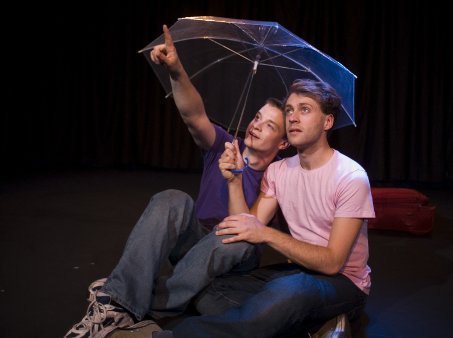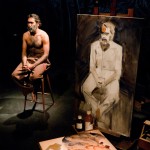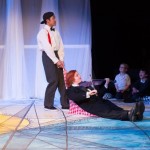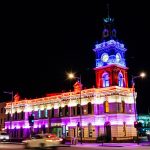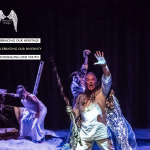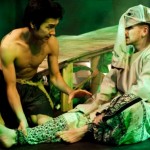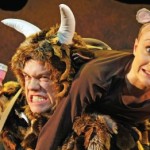Genre: Physical Theatre
Venue: Blue Elephant Theatre 59a Bethwin Rd, Camberwell, London, SE5 0XT
Low Down
Blue Elephant Theatre does it again in its theatrical quest to bring provocatively interesting work before its audience. Its latest production by writer/ director Justen Bennett of Fantastical Adventures of [Not] Being With You presents a very imaginative piece about finding passion and companionship together with all the ‘bells and whistles’ of a love affair. It energetically explodes on the Blue Elephant’s modest stage, showing that the fringe is alive and well in Bethwin St, South London. Similarly, Bennett’s play has a universal appeal that complements the theatre’s seemingly boundless imagination in choosing strong works that stretch the boundaries of its location.
Review
‘If music be the food of love’ or, as is the case in Justen Bennett’s Fantastical Adventures of [Not] Being With You, searching for the right metaphor to describe love is a problem in itself, then prepare to view the experience as nothing by constant uncertainty. Paraphrasing a often repeated line in the play:There is a way it goes and there is way it doesn’t go. This is the way it goes!
The solipsistic statement is a dominating motif in the drama which, as a tightly focused play about the nature of ‘us’, shows a pair of young lovers set up a world that is exclusively filled with just the two of them. Ironically, the theatrical nature of the presentation simultaneously demands that the pair continuously refer to the audience in order to relate to one another. At one time, the audience vocalises musical rhythms to assist in the presentation of a scene; at another time it hides a mobile phone and is asked to arbitrate to settle a disputed point by one or another of the pair.
The fact that Bennett chooses to characterise his pair of lovers as moving through their relationship with ‘audience participation’ like vaudevillian performers is key: the entire play is presented in an highly choreographed style showing the challenge of moving in together, of accepting and rejecting personal idiosyncrasies, of understanding personal boundaries, of arguing and making up and, above all, of deciding if its right or not stay together or move apart.
In keeping with the performance mode of the play, the dialogue is poetic and evocative. Each word, phrase and breath in the dialogue is placed ‘just so’, to balanced and counter-balance the dance-like embraces, spins, tumbles and jumps through which the lovers move. Often what comes across as a monologue, the pair share and deliver alternative lines as a duet. At other times what seems to be conventional dialogue is recited chorally, as the perpetual motion between the couple compels their talking to one another to erupt from their attraction and growing conflict.
Justen Bennett’s direction is masterful, as are the skills of Movement Director, David Ralfe, and Fight Director, Ronin Traynor. The whole play danced before my eyes with a youthful energy that knew no bounds. Composer James Anderson’s score is good and strong in adding depth to the mood of the play.
My one reservation about Fantastical Adventures was its inability to pull back and tackle what I know from experience can be the most difficult aspect of a relationship, that is, intimacy itself: intimacy as the non-dramatic, unspectacular and steadfast private coming together. The omission baffled me, even while I went on appreciating the show’s sense of the theatrical. I concluded that the reason was that the play was only interested in revealing, regardless of gender, the impermanence of ‘young love’ as a narcissistic all-consuming phase of life in which ‘us’ is explored as ‘me’ + ‘me’.
That explanation still did not satisfy me, however, by the end because I did not get a sense of what had changed for the pair as they experienced the new learned boundaries of ‘self’ and ‘other’ in a deeply intimate way. I felt I would have liked to have known why these two characters were fated to play their particular roles as acrobatic showmen who seem unable simply to rest in each other’s arms.
For me, Blue Elephant Artist Director Jasmine Cullingford’s comment in the theatre programme calls up some interesting questions when it states,
People are just people, whatever their sexual orientation. Written by gay playwright Justen Bennett, we have chosen to stage this premiere …with two men, but it was written as a gender-neutral play and in future could be equally well presented with either two women or a man and a woman.
I noticed how equal Ryan Wichert and Max Wilson were physically in being the same build, height and weight. In another sense it has been argued by feminists that there has always been more equality between partners in a homosexual relationship than has ever existed in traditional marriage, not the least in the way that the economic history of women shows how they have gone from being ‘chattel’ to gaining their legal and political identities. What did Fantastic Adventures show other than the two lovers who were entirely free to come and go as they pleased in their relationship? More seriously, if the play was to be enacted by a man and woman wouldn’t the fight scenes have to be implicated in the dark reality that domestic violence and the murder of women is still a ‘woman’s problem’ far, far more than it is anything else: a violence not done to her by strangers but by her husband or another male relative in her own home?
I look forward to seeing more of Justen Bennett’s work in the future. Its entertaining provocations are stylishly realised. Blue Elephant’s choice to stage Fantastic Adventures shows the diverse scope of its commitment to the production of great plays.
Reviewed by Josey De Rossi Thursday 21 June 2012
Website :
www.blueelephanttheatre.co.uk
